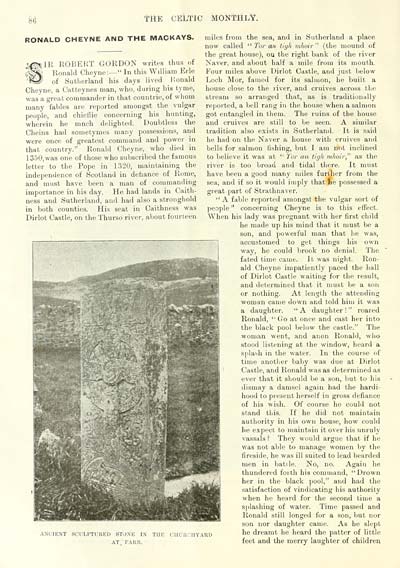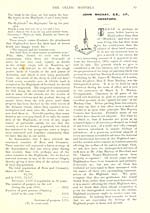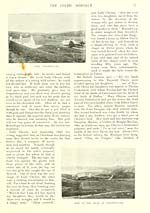Blair Collection > Celtic monthly > Volume 7, 1899
(130)
Download files
Complete book:
Individual page:
Thumbnail gallery: Grid view | List view

86
tHE CELTIC MONTHLY.
RONALD CHEYNE AND THE MACKAYS.
jl^jIR ROBERT GORDON writes thus of
^« Ronald Cheyne :— " In this William Erie
^' of Sutherland his days lived Itonald
Cheyne, a Catteynes man, who, daring his tyme,
was a great commander in that countrie, of whom
many fables are reported amongst the vulgar
people, and chietlie concerning his hunting,
wherein he mnch delighted. Doubtless the
Cheins had sometymes many possessions, and
were once of greatest command and power in
that country." Ronald Cheyne, who died in
1350, was one of those who subscribed the famous
letter to the Pope in 1320, maintaining the
independence of Scotland in defiance of Rome,
and must have been a man of commanding
importance in his day. He had lands in Caith-
ness and Sutherland, and had also a stronghold
in both counties. His seat in Caithness was
Dirlot Castle, on the Thurso river, about fourteen
^jf0m
ANCIENT .SOrLPTCRED STONE IN THE CHb'lilHYAKD
AT FARR.
miles from the sea, and in Sutherland a place
now called " Tor an tlyh m/ioiv" (the mound of
the great house), oa the right bank of the river
Naver, and about half a mile from its mouth.
Four miles above Dirlot Castle, and just below
Loch Mor, famed for its salmon, he built a
house close to the river, and cruives across the
stream so arranged that, as is traditionally
reported, a bell rang in the house when a salmon
got entangled in them. The ruins of the house
and cruives are still to be seen. A similar
tradition also exists in Sutherland. It is said
he had on the Naver a house with cruives and
bells for salmon fishing, but I am not inclined
to believe it was at '• 'J'or an tiijli mhoir," as the
river is too broad and tidal there. It must
have been a good many miles further from the
sea, and if so it would imply thatne possessed a
great part of Strathnaver.
" A fable reported amongst the vulgar sort of
people " concerning Cheyne is to this effect.
When his lady was pregnant with her first child
he made up his mind that it must be a
son, and powerful man that he was,
accustomed to get things his own
way, he could brook no denial. The
fated time came. It was niglit. Ron-
ald Cheyne impatiently paced the hall
of Dirlot Castle waiting for the result,
and determined that it must be a son
or nothing. At length the attending
woman came down and told him it was
a daughter. "A daughter!" roared
Ronald, "Go at once and cast her into
the black pool below the castle." The
woman went, and anon Ronald, who
stood listening at fhe window, heard a
splash in the water. In the course of
time another baby was due at Dirlot
Castle, and Ronald was as determined as
ever that it should be a son, but to his
dismay a damsel again had the hardi-
hood to present herself in gross defiance
of his wish. Of course he could not
stand this. If he did not maintain
authority in his own house, how could
lie expecc to maintain it over his unruly
vassals 1 They would argue that if he
was not able to manage women by the
fireside, he was ill suited to lead bearded
men in batile. No, no. Again he
thundered forth his command, "Drown
her in the black pool," and had the
satisfaction of vindicating his authority
when he heard for the second time a
splashing of water. Time passed and
Ronald still longed for a son, but nor
son nor daughter came. As he slept
he dreamt he heard the patter of little
feet and the merry laughter of children
tHE CELTIC MONTHLY.
RONALD CHEYNE AND THE MACKAYS.
jl^jIR ROBERT GORDON writes thus of
^« Ronald Cheyne :— " In this William Erie
^' of Sutherland his days lived Itonald
Cheyne, a Catteynes man, who, daring his tyme,
was a great commander in that countrie, of whom
many fables are reported amongst the vulgar
people, and chietlie concerning his hunting,
wherein he mnch delighted. Doubtless the
Cheins had sometymes many possessions, and
were once of greatest command and power in
that country." Ronald Cheyne, who died in
1350, was one of those who subscribed the famous
letter to the Pope in 1320, maintaining the
independence of Scotland in defiance of Rome,
and must have been a man of commanding
importance in his day. He had lands in Caith-
ness and Sutherland, and had also a stronghold
in both counties. His seat in Caithness was
Dirlot Castle, on the Thurso river, about fourteen
^jf0m
ANCIENT .SOrLPTCRED STONE IN THE CHb'lilHYAKD
AT FARR.
miles from the sea, and in Sutherland a place
now called " Tor an tlyh m/ioiv" (the mound of
the great house), oa the right bank of the river
Naver, and about half a mile from its mouth.
Four miles above Dirlot Castle, and just below
Loch Mor, famed for its salmon, he built a
house close to the river, and cruives across the
stream so arranged that, as is traditionally
reported, a bell rang in the house when a salmon
got entangled in them. The ruins of the house
and cruives are still to be seen. A similar
tradition also exists in Sutherland. It is said
he had on the Naver a house with cruives and
bells for salmon fishing, but I am not inclined
to believe it was at '• 'J'or an tiijli mhoir," as the
river is too broad and tidal there. It must
have been a good many miles further from the
sea, and if so it would imply thatne possessed a
great part of Strathnaver.
" A fable reported amongst the vulgar sort of
people " concerning Cheyne is to this effect.
When his lady was pregnant with her first child
he made up his mind that it must be a
son, and powerful man that he was,
accustomed to get things his own
way, he could brook no denial. The
fated time came. It was niglit. Ron-
ald Cheyne impatiently paced the hall
of Dirlot Castle waiting for the result,
and determined that it must be a son
or nothing. At length the attending
woman came down and told him it was
a daughter. "A daughter!" roared
Ronald, "Go at once and cast her into
the black pool below the castle." The
woman went, and anon Ronald, who
stood listening at fhe window, heard a
splash in the water. In the course of
time another baby was due at Dirlot
Castle, and Ronald was as determined as
ever that it should be a son, but to his
dismay a damsel again had the hardi-
hood to present herself in gross defiance
of his wish. Of course he could not
stand this. If he did not maintain
authority in his own house, how could
lie expecc to maintain it over his unruly
vassals 1 They would argue that if he
was not able to manage women by the
fireside, he was ill suited to lead bearded
men in batile. No, no. Again he
thundered forth his command, "Drown
her in the black pool," and had the
satisfaction of vindicating his authority
when he heard for the second time a
splashing of water. Time passed and
Ronald still longed for a son, but nor
son nor daughter came. As he slept
he dreamt he heard the patter of little
feet and the merry laughter of children
Set display mode to: Large image | Transcription
Images and transcriptions on this page, including medium image downloads, may be used under the Creative Commons Attribution 4.0 International Licence unless otherwise stated. ![]()
| Early Gaelic Book Collections > Blair Collection > Celtic monthly > Volume 7, 1899 > (130) |
|---|
| Permanent URL | https://digital.nls.uk/75860024 |
|---|
| Shelfmark | Blair.59 |
|---|---|
| Additional NLS resources: | |
| Attribution and copyright: |
|
| Description | A selection of books from a collection of more than 500 titles, mostly on religious and literary topics. Also includes some material dealing with other Celtic languages and societies. Collection created towards the end of the 19th century by Lady Evelyn Stewart Murray. |
|---|
| Description | Selected items from five 'Special and Named Printed Collections'. Includes books in Gaelic and other Celtic languages, works about the Gaels, their languages, literature, culture and history. |
|---|

